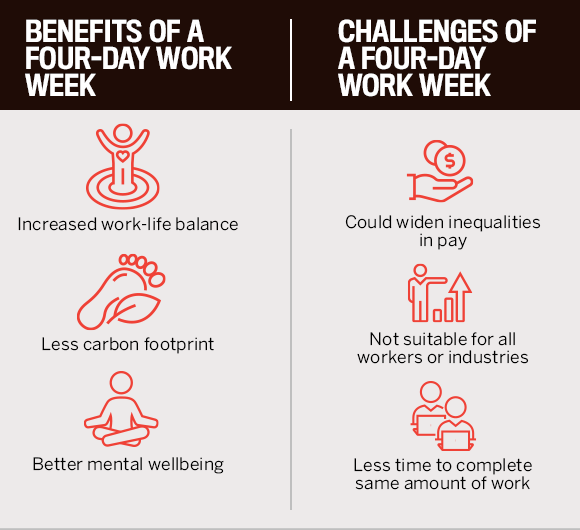
Four-day weeks increase wellbeing, but they come with risks for HR leaders

Earlier this week, 30 companies in the UK announced that they’ll be trialling a four-day work week in order to assess the benefits and setbacks. Led by 4 Day Week Global, employees at selected firms will be tasked with completing the same amount of work in four days rather than five – with the move hoping to encourage a better work-life balance. And while it’s certainly one of the largest experiments of the new working model, it’s by no means the first.
In 2020, Guysborough, the Nova Scotia municipality, trialled a four-day work week for employees throughout the town – with employees taking off Friday or Monday respectively. Spurred on by the pandemic, Barry Carroll, the CAO of the municipality, told CBC that the move was a “win-win”, adding that he doesn’t believe productivity has been impacted.
In Iceland, a four-day work week has been the norm for a while now, with 85% of Icelandic workers enjoying the perk. And, according to reports, the move has been an "overwhelming success", leading to a peak in productivity and wellbeing across the country.
Read more: McDonald's director of people strategy on thriving in a pandemic
“The Icelandic shorter working week journey tells us that not only is it possible to work less in modern times, but that progressive change is possible too,” added Gudmundur D. Haraldsson, a researcher at Alda. “Our roadmap to a shorter working week in the public sector should be of interest to anyone who wishes to see working hours reduced.”
New Zealand's prime minister has also flagged a four-day working week as way to rebuild after the COVID-19 pandemic – encouraging employers to look at the model themselves.
“I hear lots of people suggesting we should have a four-day work week,” Arden said. “Ultimately that really sits between employers and employees. But as I’ve said there’s just so much we’ve learnt about COVID-19 and that flexibility of people working from home, the productivity that can be driven out of that.”
The idea of a four-day week has been around for a while now, with individual companies trialling the policy themselves. Microsoft Japan ran a three-day weekend trial in 2019, which led to a 40% increase in productivity. What’s more, New Zealand company Perpetual Guardian ran their own model in 2018, which saw employees spend more time with their families and enhancing their work-life balance.

Benefits of a four-day working week include enhanced wellbeing and work-life balance. However, for employers, the risk is still pretty high. The move simply won’t work for some businesses, which could widen already existing inequalities in sectors.
If you think a four-day work week could work for you, it’s critical you do some forward planning before making any sudden moves. The first step, as Dr Melanie Peacock, associate professor of HR at Mount Royal, told HRD, is looking internally at your existing policies.
“When contemplating a four-day work week, an organization must first assess if this is even feasible,” she told HRD. “An initial review requires the structure of this offering. Will all employees work the same four days, or will there be staggered days off, or overlapping or core hours on-site during the workdays? What jobs are suitable for this type of arrangement, and which may not be? This requires that a thorough and transparent job analysis for all company roles be conducted.”
From here, employers need to look at how this restructuring would impact your customer or client base. In customer-facing roles or B2B companies, where people have to be on call for any client concerns, it’s important that employers stagger shifts.
“Attention to customer needs and operational requirements are critical,” added Peacock. “If implemented, what choice will employees be given? Will they have a choice to move to a new work arrangement? Care to constructive dismissal must also be given so that employees cannot argue that their working terms and conditions were unilaterally changed. If and when a four-day work week is implemented, the critical issue will be transparent communication so that employees understand why the new work structure is being put in place, what is expected of employees - who will work when - clear descriptions of how decisions have been made.”
Read more: Tesla's head of HR resigns
Finally, HR leaders need to actually ask their employees what they want. Don’t make the mistake of assuming everyone will be onboard with a four-day week – some employees may feel too pressured to complete their workloads in a reduced timeframe. Take some pulse surveys and get a feeling for the general consensus before making any announcements.
“Employees must understand that all outcomes have been reached in a fair and equitable manner based upon business needs and role requirements,” Peacock told HRD. “There shouldn't be a perception that some work arrangements are more favourable than others and these ‘better’ options were distributed to select employees without concrete or correct criteria to determine these allocations.”
Are you looking at a four-day work week? Tell us in the comments.